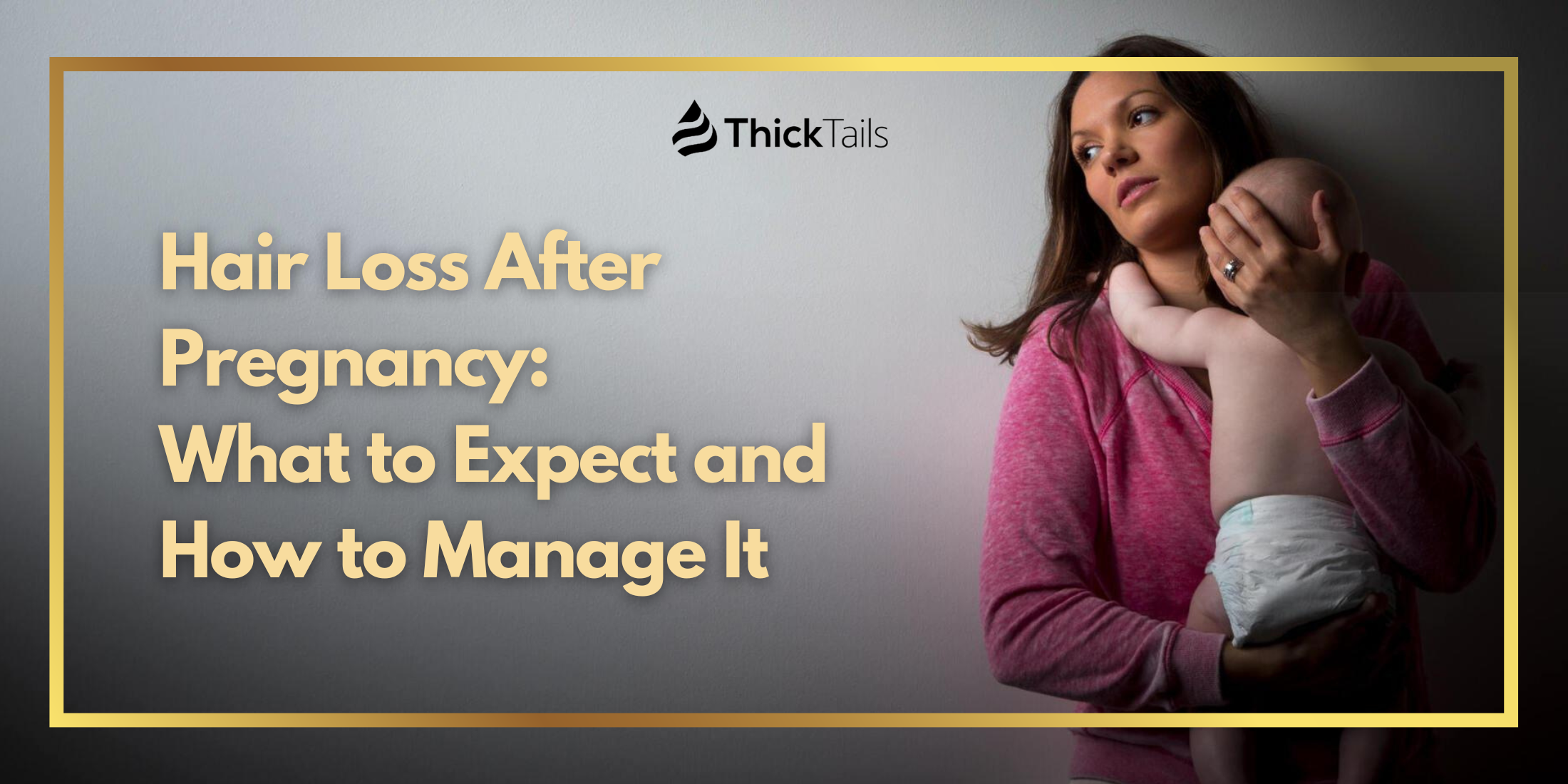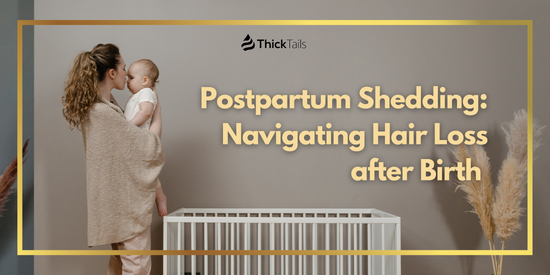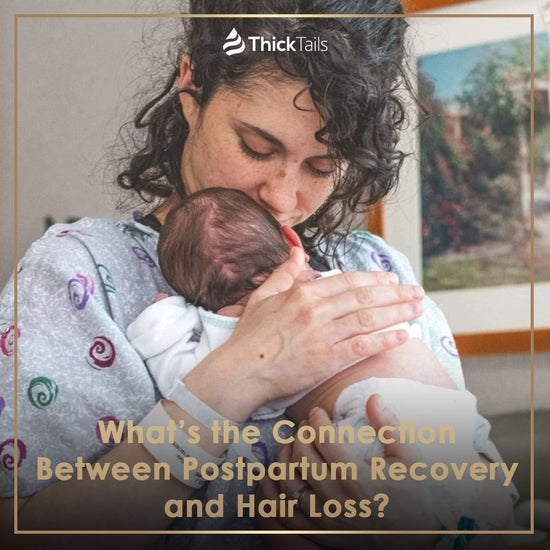Welcoming a child into the world is a beautiful, life-altering experience for women. While the focus primarily rests on the nurturing of the newborn, mothers often find themselves facing a less discussed, yet significant postpartum issue—hair loss. For many new moms, the shedding of hair can be surprising, even alarming, but understanding why it happens and how to manage it can alleviate some of the distress associated with the post-pregnancy period.
In this comprehensive guide, we will explore the science behind postpartum hair loss, practical strategies for managing it, and ways to foster a positive self-image during this transition. Whether you're currently navigating this post-baby phase or preparing for it, the knowledge and tips shared here will help you feel more in control and, hopefully, better prepared to handle the changes your hair is about to undergo.
I. Understanding Postpartum Hair Loss

Postpartum hair loss, also known as telogen effluvium, is a common phenomenon that affects a substantial number of women after giving birth. It manifests as significant hair shedding, typically beginning 1-5 months post-delivery and peaking around 3-4 months. Here's what you need to know to demystify this process.
The hormonal fluctuations that women experience during and after pregnancy play a pivotal role in postpartum hair loss. Estrogen levels, which are higher during pregnancy, begin to normalize after birth, leading to the shedding phase. Understanding this natural cycle can help women normalize their experience and seek appropriate support and solutions.
A. What Causes Hair Loss After Pregnancy
High levels of estrogen during pregnancy prolong the growing phase of hair, resulting in thicker, more robust hair. However, after childbirth, these hormone levels plummet, causing more hair follicles to enter the resting phase simultaneously. This leads to the massive shedding that can last several months.
Additionally, factors such as stress, nutrition, and sleep disturbances common in the postpartum period can exacerbate hair loss in women. It's crucial for new mothers to understand that while postpartum hair loss is temporary, taking steps towards a healthy lifestyle can further mitigate its impact and support hair regrowth.
B. The Impact of Hormonal Changes
The hormonal rollercoaster of pregnancy and its sudden decline are the primary instigators of postpartum hair loss. Estrogen, in high concentrations during pregnancy, suppresses normal hair cycling. After childbirth, as estrogen declines, the hair follicles return to their natural cycle, which can include a shedding phase, leading to noticeable hair loss.
This shift in hair growth patterns can leave many women feeling self-conscious and searching for ways to manage their appearance. Fortunately, for most women, postpartum hair loss is a temporary condition and hair growth will resume its normal cycle within six to twelve months. During this time, understanding and patience become crucial as the body works to rebalance its hormonal levels.
C. Differentiating Between Normal Shedding and Excessive Hair Loss
It's important for new moms to distinguish between the natural postpartum hair loss and more concerning, prolonged shedding. While it can be alarming to see clumps of hair in the shower or on your pillow, this phase typically resolves itself within a year after delivery. If you're experiencing hair loss beyond this period, or if you have any doubts, consulting a healthcare professional is recommended.
II. Managing Postpartum Hair Loss
New mothers can feel a loss of confidence as they grapple with the changes in their appearance. There are, however, many steps you can take to manage the process and promote healthy regrowth.
Investing in high-quality, nutrient-rich shampoo and conditioner specifically designed for postpartum hair loss can provide essential support for weakened hair, helping to strengthen and hydrate it during this challenging time. Additionally, new mothers may consider incorporating supplements rich in vitamins and minerals known to bolster hair health. Though it is always advisable to consult with a healthcare provider before starting any new supplement regime, especially during the postpartum period, these steps can contribute significantly to the well-being of women experiencing postpartum hair loss.
A. Dietary and Lifestyle Changes to Support Hair Growth
Nutritious eating habits play a significant role in promoting postpartum healing, including hair regrowth. Incorporate a variety of nutrient-dense foods such as lean proteins, fruits and vegetables, complex carbohydrates, and healthy fats into your diet. Additionally, staying hydrated and getting enough sleep can support your overall health, which, in turn, can aid in hair regeneration.
For women battling postpartum hair loss, incorporating hair supplements that are high in vitamins such as biotin, vitamin E, and omega-3 can be particularly beneficial. These supplements are known to support hair strength, quality, and growth, making them an essential part of the recovery regimen. Remember, though, that while supplements can aid in recovery, they should be used as part of a broader approach to managing postpartum hair loss, always in consultation with a healthcare provider to ensure they fit your specific needs and health situation.
B. Hair Care Tips for Postpartum Hair Loss
Adjusting your hair care routine can also make a difference. Be gentle with your hair, especially when it's wet. Use a wide-tooth comb to detangle, and avoid tight hairstyles that can cause breakage. Opt for mild shampoos and conditioners that are free from sulfates and parabens to provide a nurturing environment for your hair and scalp.
Additionally, reducing the frequency of heat styling and avoiding chemical treatments can significantly reduce stress on the hair, allowing it to grow stronger during postpartum recovery. For women navigating through the tough times of postpartum hair loss, using the right shampoo and conditioner along with recommended supplements can pave the way for healthier, more resilient hair.
C. Effective Treatments and Remedies for Regrowth
There are several treatments and remedies that can aid in the regrowth of hair post-pregnancy. These include minoxidil, also known as Rogaine, which is the only FDA-approved over-the-counter ingredient for hair regrowth. Additionally, different supplements like biotin and prenatal vitamins with a balanced mix of vitamins, minerals, and amino acids can support hair health.
III. Embracing Your Postpartum Hair Journey

Caring for your hair post-pregnancy extends far beyond managing hair loss. It's about self-love, self-care, and coming to terms with a new phase of your appearance.
While navigating postpartum hair loss, women should remember that this phase is temporary and a part of the body's natural recovery process. Selecting the right shampoo and conditioner, alongside dietary supplements specifically tailored for postpartum hair care, can significantly ease this transition. These steps not only help in mitigating hair loss but also empower women to take control of their health and recovery, reminding them of their resilience and strength.
A. Self-Care Practices for Hair and Mental Health
Mental health during postpartum is crucial, and self-care practices can significantly impact your well-being. Consider meditation, deep breathing exercises, or engaging in activities that bring you joy and relaxation. Avoiding stress can help minimize the severity and duration of postpartum hair loss.
Additionally, establishing a supportive community of women who are also navigating postpartum hair loss can provide a sense of belonging and mutual understanding. Sharing experiences and tips can be incredibly empowering, reinforcing the idea that you are not alone in this journey. Remember, every woman's postpartum path is unique, and finding personalized methods to cope with hair loss is key to a positive recovery experience.
B. Hairstyle Ideas to Manage Thinning Hair
During the regrowth phase, your hair may appear thinner, and you might find that certain hairstyles work better than others. Styling your hair with layers, which can create the illusion of volume, or using hair accessories to add dimension can help you feel more confident as your hair regains its former glory.
C. Seeking Support and Professional Advice
Above all, it's essential to know that you're not alone in this phase. Many women go through postpartum hair loss, and there is a supportive community ready to share experiences and advice. Don't hesitate to seek a professional stylist's help for advice on cuts and styles that can minimize the visual impact of hair loss. Additionally, a visit to your healthcare provider or a dermatologist can offer reassurance and guidance.
In conclusion, postpartum hair loss is a natural part of the motherhood experience for many women. By understanding its causes and effects and by adopting healthy lifestyle changes and effective hair care strategies, you can take charge of your post-pregnancy hair and overall self-image. Remember, this is just a phase, and with patience and proper care, your hair will return to its pre-pregnancy state.







